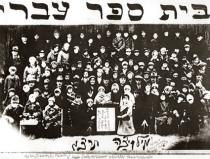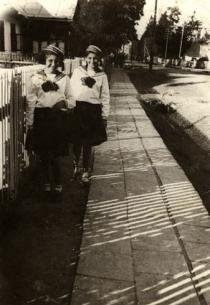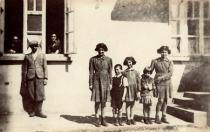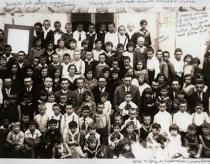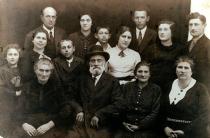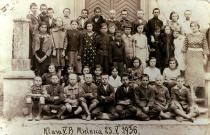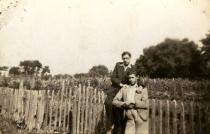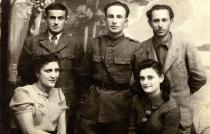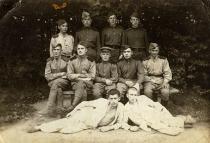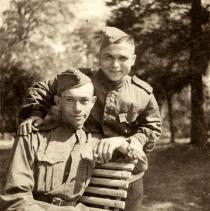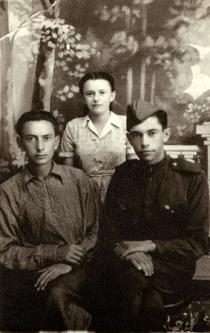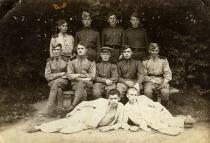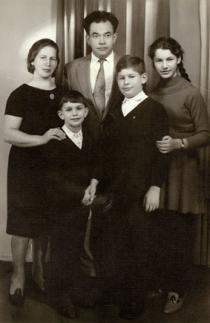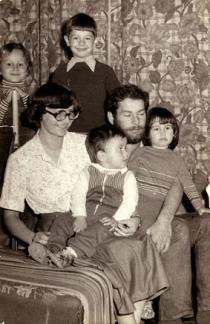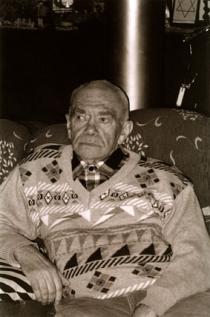This is me with my friend from Red Army. His name was Cygan. The photo was taken somewhere in Germany in 1945.
Drafting into the army was nothing special. I had to stand before the commission. I passed the tests, they drafted me, and that was it. I didn't have anything - no ID, no other documents. I could say anything - true or not true. But I told them where I was from and they accepted me. They didn't have any problem with that anymore. They saw I was a Jew but I quickly learned to speak Russian. After a year you couldn't tell me from Russians. During the war I didn't have any trouble from my being a Jew. The years spent fighting together bonded us. I worked in the battalion, right, for year and a half, and then fought in the army, so I earned the trust. First they sent me to a reserve regiment. It was called the Tashkent Infantry Regiment.
A lot happened in the army. It's hard to tell about it all. We were all equal. When things got bad, they got bad for everybody, right. I don't regret joining the Russians. I didn't have any choice. I decided not to go back home because I saw what was happening, right. I knew the Germans were coming and that they would reach my town. The Germans moved very quickly. On June 22nd 1941 they were in Przemysl and on July 1st already in Tarnopol, 250 kilometers farther. They covered a lot, a lot of kilometers.
I fought in many battles, near Staganrog, Don, Rostov. It was 1943. Staganrog had already been liberated. And later near Perekop, the isthmus between Ukraine and Crimea. Pretty rich area, right. I also got to know the Dnepr region. I fought in Dnepropetrovsk and Zaporizhia districts. There were lots of battles, in many different parts of the country. I remember this story from 1941. We stood near Staganrog. Some horses were killed there. And soldiers, too. There was shelling, or an air raid, I don't remember exactly. It was late fall, frost. And in the spring of 1942 we returned to that area. It was early spring, we were already short on food. The commanders remembered the horses lying there, buried somewhere in a gorge, covered with snow. And so they sent some people to dig them out, and the horses were used as food. In 1943 our route led through the Kherson region . It's near Odessa. And in 1944 we entered the Polish territories. It was the Polesia region, we stationed in a town called Sarny. The frontline stopped there for some time.
From August 1944 we stayed near Serock, by the conflux of the rivers Bug and Narev. The town had been evacuated by the Russians. By late fall we didn't have any fodder for the horses anymore. The soldiers would go to Serock, to the suburbs. They dismantled thatched roofs, right, to feed the horses with them. Afterwards we moved through Poland, heading for Bydgoszcz. I remember we stayed a bit longer in Torun, or rather just outside Torun. Because the Germans stopped there. We spent two nights in a church somewhere. I know we crossed the Vistula river twice. The supply officers learned there was an artificial honey factory nearby. There was no-one to watch over it, right. They sent us - me and two other soldiers - to the factory. We took a car and brought the honey to the unit.
My unit was not heading for Berlin. We were not part of the Berlin drive. We belonged to the Second Ukrainian Front. We got to Bydgoszcz and then turned towards Gdansk. But first we reached a small German town called Rummelsburg, nowadays Miastko. We spent the night 3-4 kilometers outside the town. We were no longer in the assaulting batch. The fighting hadn't been too heavy because the town was intact, only the church was burned. I guess the Germans had set fire to it. In any case, there were churches burning all along the way. The Germans were setting them on fire because they used it as reference points, right. We slept in a manor. Beautiful palace. And they showed us movies one night. We stayed longer in one place so the cinema came and they showed us a movie in the barn. The cinema was a car with a generator, right, and it projected the movie on a wall. The screen was quite big, I remember. The army had a lot of those. Every division, or maybe even regiment, so we got to use it sometimes. When a unit was sent to the rear to rest, right, there were baths and disinfection, and sometimes someone would come and show a movie. Well, you had to entertain the lice-infested people somehow, you know? There were also vocal groups. Whenever there was a longer stay; the Russians had dozens of those things.
We set off for Gdansk from there. Outside Gdansk I saw my first Polish soldiers. The Kosciuszko Division. Yes. I was no longer fighting. I assisted the regiment's commander, I was a sort of an interpreter. I spoke a little German, right. In 1942, while recuperating, I met some Germans from the colony near the kolkhoz, right. We had contacts with them and so I started to learn German a bit. And Yiddish is pretty close to German anyway. From Gdansk they transferred us to the Oder river. To the town Gryfino. But there was no fighting along the way. These lands were liberated.
The end of the war found me in a small town by the sea. Or rather a big resort village, on the German side. It was called Heiligendamm. There was a German naval base. We got there on the night of 2nd May, or maybe 1st May, and we slept there. A plane came out of the blue and dropped a bomb on the barracks' yard, but no-one was hurt. The end of the war. Well, the fighting went on but we didn't take part in it anymore, it was all quiet there. The official end of the war found me on a meadow, a pasture. It was my turn to watch over the horses and I saw the soldier who usually brought us lunch, screaming from a distance that the war had ended, right. It was on 8th May, or maybe 9th. I remember Stalin giving a speech about the end of the war, might have been two weeks later. On one hand I was happy I was alive, but on the other I didn't have any news of my family. And they were gone.
I was demobilized in 1946. I came back to my town, to Mielnica Podolska.

